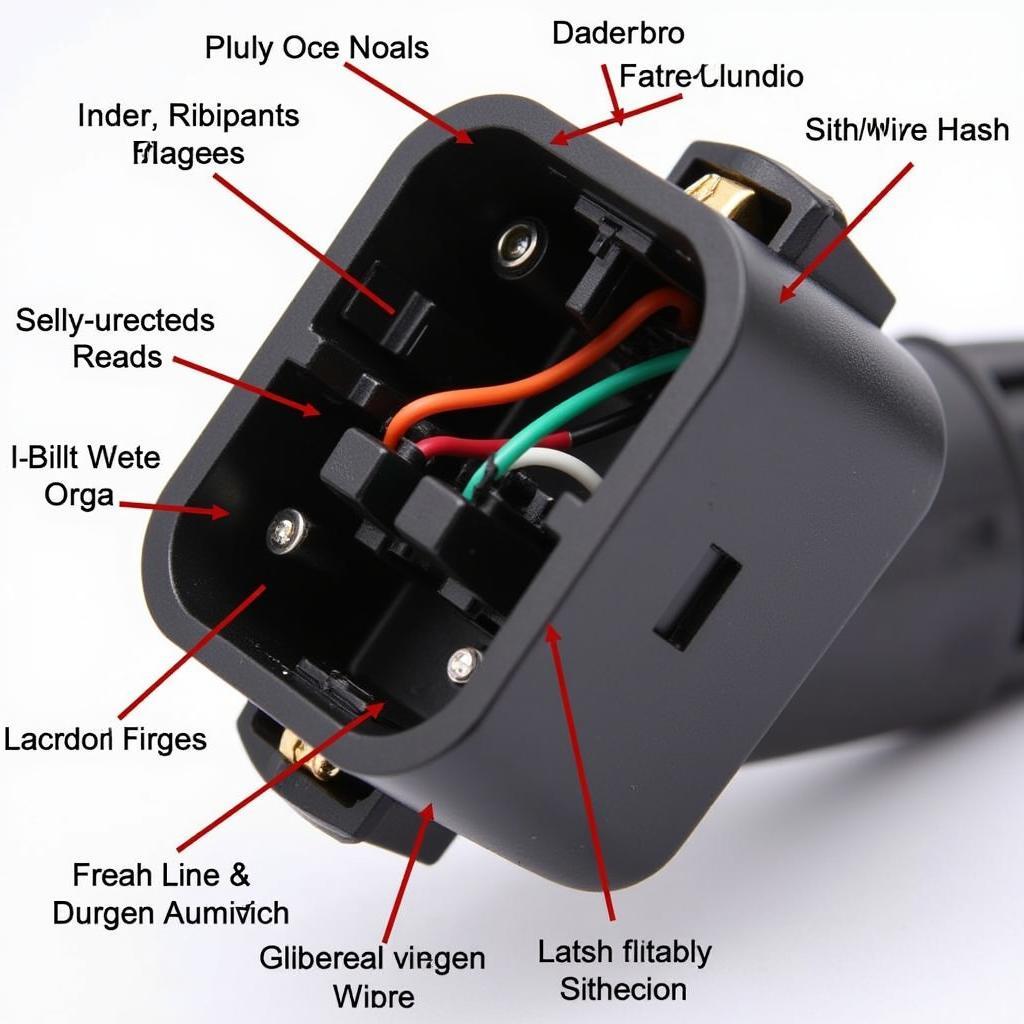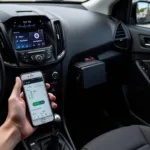Car diagnostic plug wiring can seem like a mystery, especially with the ever-increasing complexity of modern vehicles. Whether you’re a DIY enthusiast looking to troubleshoot your car or a professional mechanic seeking to expand your knowledge, understanding this crucial aspect of car diagnostics is essential. This article dives deep into the world of car diagnostic plug wiring, providing valuable insights to help you navigate this technical terrain.
Decoding the Diagnostic Port
Your car’s diagnostic port, also known as the OBD-II port, is the gateway to your vehicle’s internal computer system. This standardized 16-pin connector, typically located under the dashboard on the driver’s side, allows communication between your car’s electronic control units (ECUs) and external diagnostic tools.
The Significance of Car Diagnostic Plug Wiring
Each pin within the diagnostic port has a specific function, determined by the car’s make and model. These functions range from transmitting engine speed and fuel system status to providing information about the airbag system and emissions control. Understanding the purpose of each pin and its corresponding wire color is crucial for accurate diagnosis and troubleshooting.
For instance, if you’re experiencing issues with your engine’s performance, connecting a diagnostic scanner to the appropriate pins related to the engine control unit will allow you to read and interpret fault codes, live data, and other essential parameters. This information is crucial for pinpointing the root cause of the problem and performing necessary repairs.
Common Diagnostic Plug Wiring Issues
While the OBD-II port has standardized pin assignments, variations in wiring and protocols exist across different vehicle manufacturers and models. This can lead to challenges when using generic diagnostic tools or interpreting fault codes.
Some common issues include:
- Loose or corroded connections: Over time, vibrations and exposure to moisture can lead to loose or corroded connections within the diagnostic port, disrupting communication between the scanner and the vehicle’s ECUs.
- Damaged wiring: Physical damage to the wiring harness leading to the diagnostic port, often caused by rodent chewing or improper installation of aftermarket accessories, can interrupt signal transmission.
- Software incompatibility: Using outdated or incompatible diagnostic software can lead to communication errors or an inability to access certain vehicle systems.
Troubleshooting Diagnostic Plug Wiring Problems
Identifying and resolving issues with your car diagnostic plug wiring often requires a systematic approach. Here are a few steps you can take:
- Visual Inspection: Begin by visually inspecting the diagnostic port and the surrounding wiring harness for any signs of physical damage, loose connections, or corrosion.
- Check for Power: Using a multimeter, verify that the appropriate pins within the diagnostic port are receiving power. This ensures that the scanner can establish communication with the vehicle’s ECUs.
- Consult Wiring Diagrams: Refer to your vehicle’s specific wiring diagrams to identify the correct pin assignments and wire colors for the systems you’re trying to diagnose.
- Seek Professional Assistance: If you’re unable to resolve the issue or suspect a more complex wiring problem, it’s always recommended to seek assistance from a qualified automotive electrician or mechanic.
Conclusion
Understanding car diagnostic plug wiring is essential for anyone who wants to delve into the world of automotive diagnostics. By familiarizing yourself with the basics of the OBD-II port, common wiring issues, and troubleshooting techniques, you can confidently diagnose and address problems with your vehicle, ensuring optimal performance and reliability. For more insights on specific diagnostic codes or troubleshooting guides, explore our comprehensive resources on DiagFixPro.com.
FAQs
1. Can I damage my car by connecting a diagnostic scanner to the wrong pins?
While connecting to the wrong pins is unlikely to cause severe damage in most modern cars, it’s crucial to exercise caution and always refer to your vehicle’s specific wiring diagrams to avoid potential issues.
2. Why is my diagnostic scanner not communicating with my car?
Several factors could prevent communication, including loose connections, damaged wiring, a blown fuse, or incompatible software. Start by visually inspecting the diagnostic port and checking for power. If the problem persists, consult your scanner’s user manual or seek professional help.
3. Where can I find reliable wiring diagrams for my car?
You can often find wiring diagrams in your vehicle’s repair manual or by searching online resources specific to your car’s make, model, and year.
4. What should I do if I suspect a wiring issue with my car’s diagnostic system?
It’s best to avoid DIY repairs for complex wiring issues. Seek assistance from a qualified automotive electrician or mechanic who has the expertise and equipment to diagnose and repair the problem safely and effectively.
5. What are some common car diagnostic plug wiring modifications?
Some car enthusiasts and mechanics modify their diagnostic plug wiring for various purposes, such as adding custom gauges, installing aftermarket performance chips, or enabling specific diagnostic features. However, it’s crucial to note that such modifications can affect the vehicle’s warranty and potentially lead to diagnostic errors if not performed correctly.
6. How can I prevent future problems with my car’s diagnostic plug wiring?
Regularly inspecting the diagnostic port for signs of damage or corrosion, ensuring proper installation of any aftermarket accessories, and using compatible diagnostic tools can help prevent future issues with your car’s diagnostic plug wiring.
7. Can I learn more about car diagnostics and troubleshooting?
Yes, DiagFixPro.com offers a wealth of information on car diagnostics bournemouth, delphi car diagnostic codes, and car fault diagnostic equipment.
Need further assistance with your car’s diagnostic system?
Our team of experts is available 24/7 to provide personalized support. Contact us via WhatsApp at +1(641)206-8880 or email us at [email protected]. We’re here to help!


